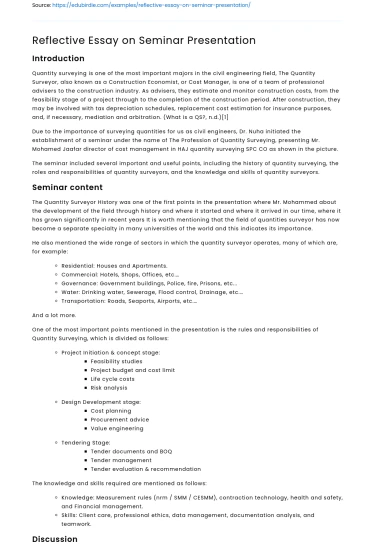Introduction
Quantity surveying is one of the most important majors in the civil engineering field, The Quantity Surveyor, also known as a Construction Economist, or Cost Manager, is one of a team of professional advisers to the construction industry. As advisers, they estimate and monitor construction costs, from the feasibility stage of a project through to the completion of the construction period. After construction, they may be involved with tax depreciation schedules, replacement cost estimation for insurance purposes, and, if necessary, mediation and arbitration. (What is a QS?, n.d.)[1]
Due to the importance of surveying quantities for us as civil engineers, Dr. Nuha initiated the establishment of a seminar under the name of The Profession of Quantity Surveying, presenting Mr. Mohamed Jaafar director of cost management in HAJ quantity surveying SPC CO as shown in the picture.
Save your time!
We can take care of your essay
- Proper editing and formatting
- Free revision, title page, and bibliography
- Flexible prices and money-back guarantee
The seminar included several important and useful points, including the history of quantity surveying, the roles and responsibilities of quantity surveyors, and the knowledge and skills of quantity surveyors.
Seminar content
The Quantity Surveyor History was one of the first points in the presentation where Mr. Mohammed about the development of the field through history and where it started and where it arrived in our time, where it has grown significantly in recent years It is worth mentioning that the field of quantities surveyor has now become a separate specialty in many universities of the world and this indicates its importance.
He also mentioned the wide range of sectors in which the quantity surveyor operates, many of which are, for example:
- Residential: Houses and Apartments.
- Commercial: Hotels, Shops, Offices, etc.…
- Governance: Government buildings, Police, fire, Prisons, etc...
- Water: Drinking water, Sewerage, Flood control, Drainage, etc.…
- Transportation: Roads, Seaports, Airports, etc.…
And a lot more.
One of the most important points mentioned in the presentation is the rules and responsibilities of Quantity Surveying, which is divided as follows:
- Project Initiation & concept stage:
- Feasibility studies
- Project budget and cost limit
- Life cycle costs
- Risk analysis
- Design Development stage:
- Cost planning
- Procurement advice
- Value engineering
- Tendering Stage:
- Tender documents and BOQ
- Tender management
- Tender evaluation & recommendation
The knowledge and skills required are mentioned as follows:
- Knowledge: Measurement rules (nrm / SMM / CESMM), contraction technology, health and safety, and Financial management.
- Skills: Client care, professional ethics, data management, documentation analysis, and teamwork.
Discussion
The seminar was wonderful, and the pros were much more than the negatives, so the speaker's language was heard and understood appropriately without forgetting the body language that attracted attention except for Christina who was standing in her place with a low voice. The slideshows were clear, but a few needed to add some pictures to help understand.
Conclusion
In conclusion, I thank Dr. Nuha Mr. Mohammed, and his colleagues for this wonderful and useful presentation to us especially as civil engineering students in the last stage where we now have a great background in the field of Quantity Surveying which is unfortunately limited to one course in our study plan at the University of Bahrain.






 Stuck on your essay?
Stuck on your essay?

